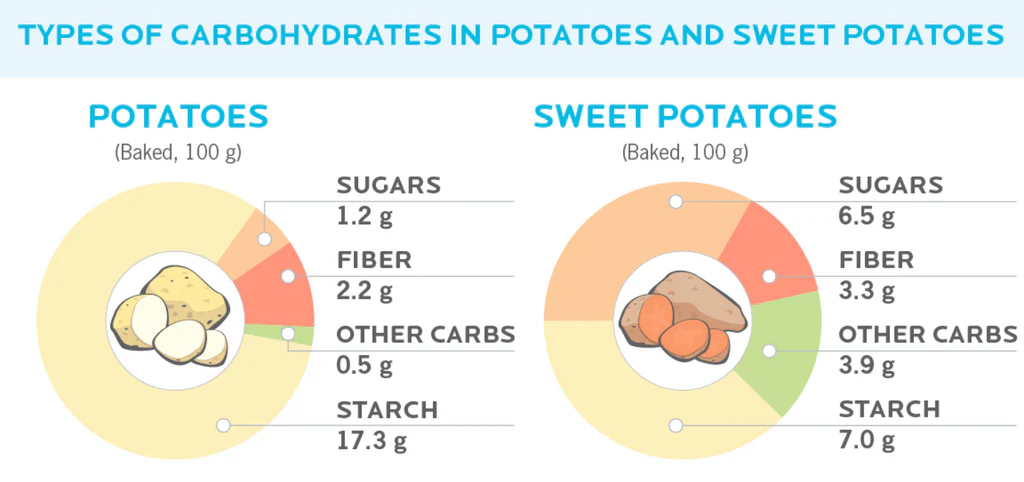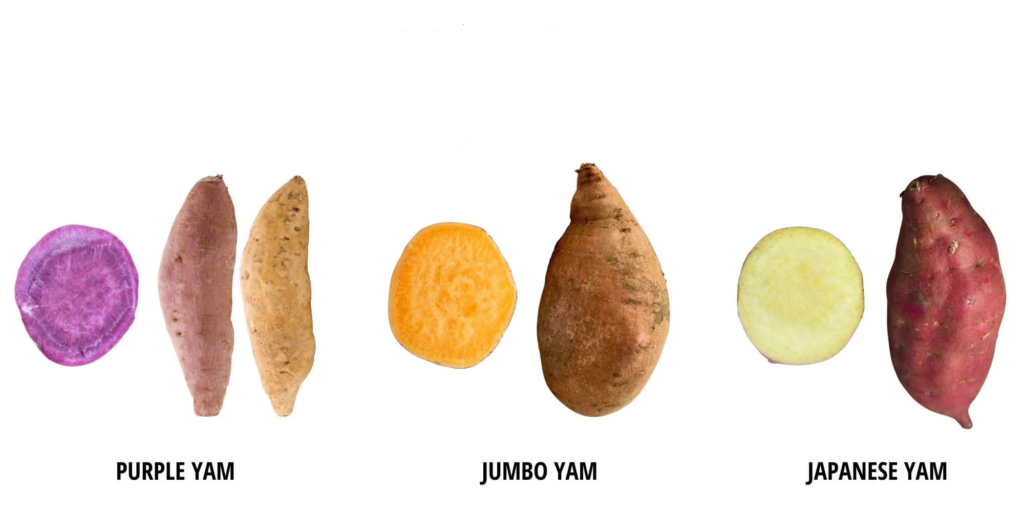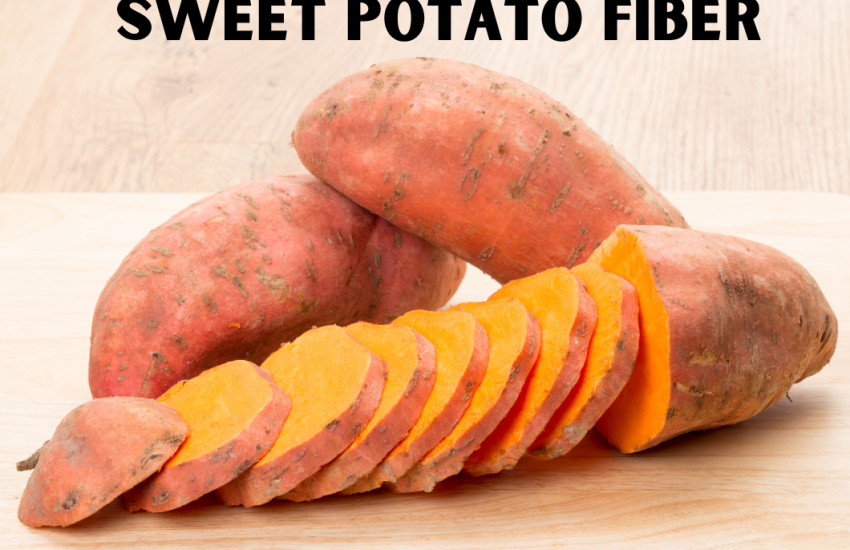Sweet Potato Fiber: A Comprehensive Guide

Sweet potatoes are not handiest scrumptious however additionally filled with an array of important nutrients, which includes fiber. This starchy root vegetable not simplest affords important nutrients and minerals but also includes a huge quantity of fiber that promotes standard health.
In this comprehensive guide, I will share with you the sweet potato fiber, its benefits, and how it contributes to a healthy diet.
What is Sweet Potato Fiber?
Sweet potato fiber is derived from the flesh and skin of the sweet potato (Ipomoea batatas), an underground tuber. This root vegetable is not only nutritious but also rich in both soluble and insoluble fiber. Soluble fiber aids in lowering cholesterol and regulating blood sugar levels, while insoluble fiber helps maintain bowel regularity and promotes gut health.
Types of Sweet Potatoes

Sweet potatoes are available in various colors, such as orange, white, purple, red, pink, violet, and yellow. The orange-fleshed variety is perhaps the most popular, but other colors offer unique tastes and nutritional benefits.
Soluble and Insoluble Fiber
Sweet potatoes comprise both soluble and insoluble fiber, with a medium-sized candy potato presenting around three.8 grams of typical fiber. Soluble fiber payments for 15-23% of the overall fiber content material, generally within the shape of pectin, on the identical time as insoluble fiber makes up 77-85%, which incorporates cellulose, hemicellulose, and lignin.
Nutritional Facts of Sweet Potatoes

A 100-gram serving of raw sweet potatoes provides the following nutrients:
- Calories: 86
- Water: 77%
- Protein: 1.6 grams
- Carbs: 20.1 grams
- Sugar: 4.2 grams
- Fiber: 3 grams
- Fat: 0.1 grams
Additionally, candy potatoes are wealthy in critical nutrients and minerals, which include beta carotene, nutrition C, potassium, manganese, diet B6, and nutrition B5.
Cooked Sweet Potato Fiber
The cooking process affects the nutritional value of sweet potatoes, including their fiber content. Steaming or boiling sweet potatoes helps retain most of their fiber, while baking or frying may cause a slight decrease. However, cooked sweet potatoes nevertheless offer a big quantity of fiber, making them a precious addition to a balanced weight loss plan.
Health Benefits of Sweet Potato Fiber
Sweet potato fiber offers numerous health benefits, ranging from improved digestion to better blood sugar control. Let’s explore some of its most notable advantages.
Gastrointestinal Health
Sweet potato fiber promotes a healthy digestive system by providing a mix of soluble and insoluble fiber. Soluble fiber helps lower cholesterol and balance glucose levels, while insoluble fiber supports bowel regularity and overall gut health.
Immune Support
The high quantities of beta carotene and vitamin C in sweet potatoes make a contribution to a robust immune device. These powerful antioxidants help alter the immune machine and bolster the body’s herbal defenses in opposition to infections.
Heavy Metal Protection
Sweet potatoes contain antioxidants that may help lessen the threat of toxicity from heavy steel residues together with arsenic, cadmium, and mercury. Consuming sweet potatoes can support your digestive system and protect against the harmful effects of these heavy metals.
Blood Sugar Regulation
Although sweet potatoes contain natural sugars, their fiber content helps slow down sugar absorption into the bloodstream. This property makes sweet potatoes a suitable addition to a diet for individuals with type 2 diabetes or those looking to maintain balanced blood sugar levels.
Sweet Potatoes vs. Regular Potatoes
Sweet potatoes and regular white potatoes differ in nutritional content, providing unique health benefits. Both vegetables offer comparable amounts of water, carbs, fat, and protein. However, sweet potatoes have a lower glycemic index, higher fiber content, and greater beta carotene than normal potatoes.
How to Include Sweet Potato Fiber in Your Diet

Incorporating sweet potato fiber into your diet is easy and delicious. Here are some healthy ways to enjoy sweet potatoes and benefit from their fiber content:
- Steam or boil sweet potatoes to retain most of their fiber and nutrients.
- Add small cubes of sweet potatoes to a garden salad.
- Combine boiled sweet potatoes with brown rice and black beans for a nutritious veggie taco.
- Create a stew with sweet potatoes, tomatoes, chickpeas, ginger, and spices in a sluggish cooker.
- Make a sweet potato hash with onions, celery, and black beans.
- Enjoy a creamy sweet potato and apple soup.
- Potential Downsides of Sweet Potatoes
While sweet potatoes are commonly nicely-tolerated, they include oxalates, which may additionally boom the hazard of kidney stone formation. Individuals susceptible to growing kidney stones need to restriction their sweet potato intake.
Frequently Asked Question
How much fiber is in 100g of sweet potatoes?
Sweet potatoes are a good source of dietary fiber. On average, raw sweet potatoes contain approximately 2.5 grams of fiber per 100 grams. However, it’s important to note that the exact amount of fiber can vary slightly depending on the variety and size of the sweet potato.
What is sweet potato high in?

Sweet potatoes are highly nutritious and offer several health benefits. They are particularly rich in the following nutrients:
- Dietary Fiber: Sweet potatoes are a good source of dietary fiber, which aids in digestion, promotes a feeling of fullness, and helps maintain healthy blood sugar levels.
- Vitamins: Sweet potatoes are packed with various vitamins, including vitamin A, vitamin C, and several B-vitamins like B6. Vitamin A is especially abundant in sweet potatoes, providing a significant portion of the recommended daily intake. Vitamin C is an antioxidant that supports immune function, while B-vitamins play essential roles in energy metabolism.
- Minerals: Sweet potatoes contain important minerals such as potassium, manganese, and copper. Potassium is crucial for maintaining healthy blood pressure and heart function, while manganese and copper contribute to antioxidant defense and various enzymatic reactions in the body.
- Antioxidants: Sweet potatoes are rich in antioxidants, including beta-carotene, which gives them their vibrant orange color. Beta-carotene converts to vitamin A in the body and helps protect cells from damage caused by harmful free radicals.
- Complex Carbohydrates: Sweet potatoes are a source of complex carbohydrates, providing sustained energy and contributing to a balanced diet.
- Other Nutrients: Sweet potatoes also contain smaller amounts of other nutrients like calcium, iron, magnesium, and phosphorus, which are important for maintaining overall health and well-being.
Overall, sweet potatoes are a nutritious food choice that offers a range of essential nutrients and health-promoting compounds.
Sweet potatoes are a nutritious and fiber-rich addition to a balanced food plan. Their soluble and insoluble fiber content supports gastrointestinal health, immune function, blood sugar regulation, and heavy metal protection. By incorporating sweet potatoes into your meals, you can enjoy their delicious taste and reap the numerous health benefits that sweet potato fiber has to offer.
